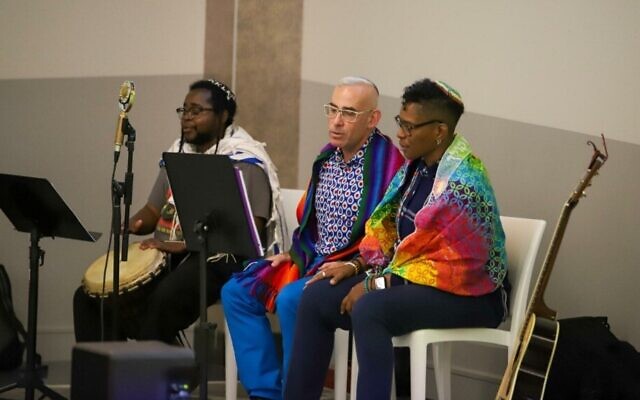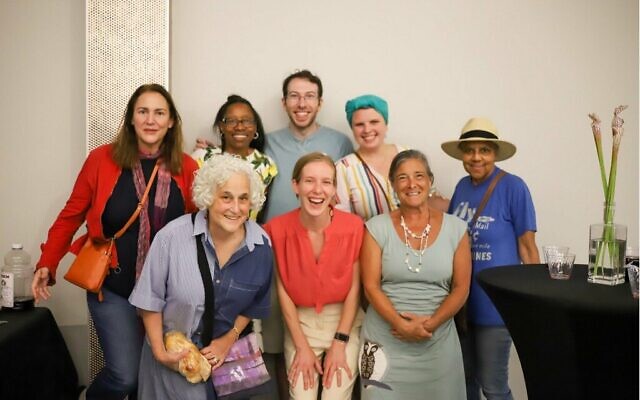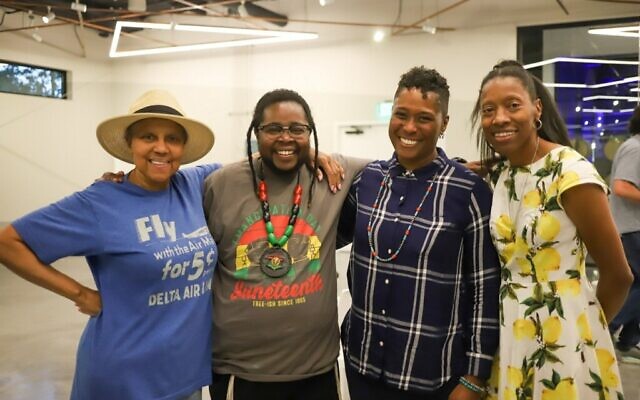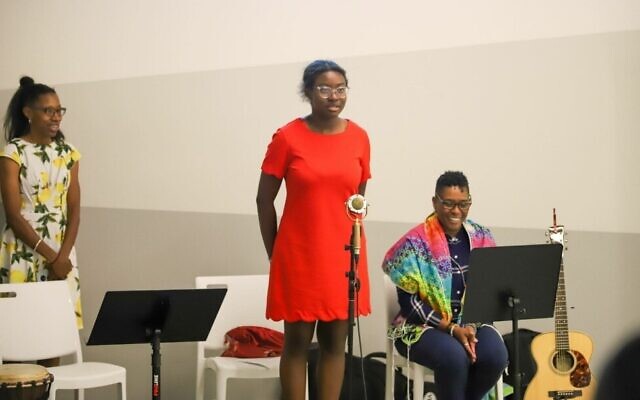A Juneteenth Kabbalat Shabbat
The Shabbat event was largely the brainchild of Rabbi Sandra Lawson, who in 2020 founded Kol HaPanim where Jews of color could be seen as community and spiritual leaders.

Over 40 people braved the stormy weather Friday night, June 17, to attend a special Kabbalat Shabbat service at the Distillery of Modern Art in Chamblee, while around 200 more tuned in online.
The event was co-hosted by the Atlanta Jews of Color Council (AJOCC) and Kol HaPanim (All Faces), and sponsored by Reconstructing Judaism; Jewish Equity, Diversity and Inclusion (JEDI), powered by the Federation of North America; The Weber School; Bend the Arc Jewish Action Atlanta; The Global Purpose Approach; The MACoM Community Mikvah; Rise Up and The Black Jewish Liberation Collective.
The Shabbat event was largely the brainchild of Rabbi Sandra Lawson, who in 2020 founded Kol HaPanim, an inclusive and diverse Jewish community based in North Carolina, where Jews of color could be seen as community and spiritual leaders.
They began hosting monthly Kabbalat Shabbat services online in March 2021, and Rabbi Lawson began looking for a place to hold an in-person event led by Jews of color in early 2022.

She spoke with an old friend of hers, Rabbi Joshua Lesser, formerly of Congregation Bet Haverim, who told her, “You have to talk to Victoria” Raggs, founder of the AJOCC. And the two began organizing the night’s event.
“She [Lawson] really wanted to give rabbis of color/rabbinical students of color an opportunity to be seen and heard,” said Raggs. In this case, the rabbinical student in question was Dr. Koach Baruch Frazier, the current rabbinical intern at Kol HaPanim.
That night, as everyone settled in, Rabbi Lawson and Frazier began to sing “Eyes Set on Freedom” to invite everyone into the service. After Miriam Raggs, Victoria Raggs’s daughter, led the Shechehiyanu prayer to recognize the unique importance of the event and Rabbi Veronica Shay Israel lit the candles, the evening continued with prayers and songs, as Lawson strummed the guitar and Frazier played drums.
The crowd, which had started off joining in rather quietly, was singing loudly and exuberantly with them by the end.

Rabbi Lesser made a brief statement, welcoming the blessings of Shabbat, but recognizing Juneteenth as “a blessing not fully achieved.” He then led the crowd in a moment of silence.
Frazier gave a D’var Torah, comparing Juneteenth to the jubilee year, when all slaves in Israel are to be freed, and to Pesach Sheni, the second Pesach for those who were, for whatever reason, unable to celebrate the first. He noted that, for the Black residents of Galveston, Texas, the celebration was no less exuberant, though it took far, far too long to come. “You too,” he said, “must make time to mark your freedom from bondage.”
The rabbis concluded the service with a special Mourner’s Kaddish for Black lives (although those wishing to say the traditional Mourners’ Kaddish were encouraged to do so). The traditional prayers over the wine and challah were said and the crowd stood to converse, but the importance of what they’d just participated in was not lost on anyone.

Rabbi Lawson explained how much it meant for a lot of Jews of color, who often face discrimination both outside and within the Jewish community, to be able to have a community and a place, whether physical or virtual, to gather and to be seen — a large part of the reason she founded Kol HaPanim in the first place.
Frazier, who will begin leading Kol HaPanim’s services in the coming months, also noted the importance of bringing the most vulnerable people to the center. “In Bamidbar, when the people Israel traveled, the Levites, who traveled in the center, could own no land or wealth. The most vulnerable people were in the middle. Not the margins. The center,” he said.
It’s a sentiment with which Raggs also agrees.
“LGBTQ, disabled, Black Jews, anyone who has felt historically excluded, it’s time to bring those people in,” she said.
“Juneteenth is a Jewish holiday, it is an American holiday, because, as human beings, until all of us are free, none of us are.”
- News
- Local
- Robert Garber
- Juneteenth
- Shabbat
- Distillery of Modern Art
- Atlanta Jews of Color Council (AJOCC)
- Kol HaPanim (All Faces)
- Reconstructing Judaism; Jewish Equity
- Diversity and Inclusion (JEDI)
- Federation of North America
- The Weber School
- Bend the Arc Jewish Action Atlanta
- The Global Purpose Approach
- The MACoM Community Mikvah
- Rise Up and The Black Jewish Liberation Collective
- Rabbi Sandra Lawson
- Rabbi Joshua Lesser
- Congregation Bet Haverim
- Dr. Koach Baruch Frazier
- Rabbi Veronica Shay
- Miriam Raggs



comments